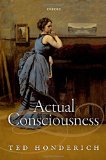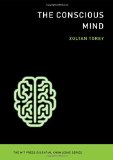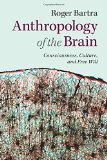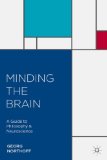August 18, 2014

Actual Consciousness by Ted Honderich (Oxford University Press, 2014)
(amazon.co.uk)
Book description from the publisher:
What is it for you to be conscious? There is no agreement whatever in philosophy or science: it has remained a hard problem, a mystery. Is this partly or mainly owed to the existing theories not even having the same subject, not answering the same question? In Actual Consciousness, Ted Honderich sets out to supersede dualisms, objective physicalisms, abstract functionalism, general externalisms, and other positions in the debate. He argues that the theory of Actualism, right or wrong, is unprecedented, in nine ways. (1) It begins from gathered data and proceeds to an adequate initial clarification of consciousness in the primary ordinary sense. This consciousness is summed up as something’s being actual. (2) Like basic science, Actualism proceeds from this metaphorical or figurative beginning to what is wholly literal and explicit–constructed answers to the questions of what is actual and what it is for it to be actual. (3) In so doing, the theory respects the differences of consciousness within perception, consciousness that is thinking in a generic sense, and consciousness that is generic wanting. (4) What is actual with your perceptual consciousness is a subjective physical world out there, very likely a room, differently real from the objective physical world, that other division of the physical world. (5) What it is for the myriad subjective physical worlds to be actual is for them to be subjectively physical, which is exhaustively characterized. (6) What is actual with cognitive and affective consciousness is affirmed or valued representations. The representations being actual, which is essential to their nature, is their being differently subjectively physical from the subjective physical worlds. (7) Actualism, naturally enough when you think of it, but unlike any other existing general theory of consciousness, is thus externalist with perceptual consciousness but internalist with respect to cognitive and affective consciousness. (8) It satisfies rigorous criteria got from examination of the failures of the existing theories. In particular, it explains the role of subjectivity in thinking about consciousness, including a special subjectivity that is individuality. (9) Philosophers and scientists have regularly said that thinking about consciousness requires just giving up the old stuff and starting again. Actualism does this. Science is served by this main line philosophy, which is concentration on the logic of ordinary intelligence–clarity, consistency and validity, completeness, generality.
Google Books preview:
See also: Author’s website
Comments (0)
- consciousness,new books
August 12, 2014

The Conscious Mind (MIT Press Essential Knowledge) by Zoltan Torey (MIT Press, 2014)
(kindle ed.), (amazon.co.uk), (UK kindle ed.)
Book description from the publisher:
How did the human mind emerge from the collection of neurons that makes up the brain? How did the brain acquire self-awareness, functional autonomy, language, and the ability to think, to understand itself and the world? In this volume in the Essential Knowledge series, Zoltan Torey offers an accessible and concise description of the evolutionary breakthrough that created the human mind. Drawing on insights from evolutionary biology, neuroscience, and linguistics, Torey reconstructs the sequence of events by which Homo erectus became Homo sapiens. He describes the augmented functioning that underpins the emergent mind — a new (“off-line”) internal response system with which the brain accesses itself and then forms a selection mechanism for mentally generated behavior options. This functional breakthrough, Torey argues, explains how the animal brain’s “awareness” became self-accessible and reflective — that is, how the human brain acquired a conscious mind. Consciousness, unlike animal awareness, is not a unitary phenomenon but a composite process. Torey’s account shows how protolanguage evolved into language, how a brain subsystem for the emergent mind was built, and why these developments are opaque to introspection. We experience the brain’s functional autonomy, he argues, as free will. Torey proposes that once life began, consciousness had to emerge — because consciousness is the informational source of the brain’s behavioral response. Consciousness, he argues, is not a newly acquired “quality,” “cosmic principle,” “circuitry arrangement,” or “epiphenomenon,” as others have argued, but an indispensable working component of the living system’s manner of functioning.
Comments (0)
- consciousness,new books

Anthropology of the Brain: Consciousness, Culture, and Free Will by Roger Bartra (Cambridge University Press, 2014)
(kindle ed.), (amazon.co.uk), (UK kindle ed.)
Book description from the publisher:
In this unique exploration of the mysteries of the human brain, Roger Bartra shows that consciousness is a phenomenon that occurs not only in the mind but also in an external network, a symbolic system. He argues that the symbolic systems created by humans in art, language, in cooking or in dress, are the key to understanding human consciousness. Placing culture at the centre of his analysis, Bartra brings together findings from anthropology and cognitive science and offers an original vision of the continuity between the brain and its symbolic environment. The book is essential reading for neurologists, cognitive scientists and anthropologists alike.
Google Books preview:
Comments (0)
- consciousness,culture,new books
May 25, 2014

Minding the Brain: A Guide to Philosophy and Neuroscience by Georg Northoff (Palgrave Macmillan, 2014)
(amazon.co.uk)
Book description from the publisher:
This book explores how the relationship between philosophy and the brain can inform neuroscience, the mind-brain problem and debates about consciousness. Written in a lively style with extensive pedagogy to explain complex concepts, this is interesting reading for students and researchers of psychology, neuroscience and philosophy.
Table of Contents:
Introduction
PART I: MIND AND BRAIN – FROM PHILOSOPHY THROUGH NEUROSCIENCE TO NEUROPHILOSOPHY
1. Philosophy and the Mind – Philosophy of Mind and Phenomenology
2. Philosophy and Science – Naturalism
3. Mind, Brain and Science – Psychology and Neuroscience
4. Brain and Philosophy – Neurophilosophy
PART II: MIND-BRAIN PROBLEM – FROM PHILOSOPHY OF MIND TO PHILOSOPHY OF BRAIN
5. Mental Approaches to the Mind-brain Problem
6. Physical and Functional Approaches to the Mind-brain Problem
7. Non-mental and Non-physical Approaches to the Mind-brain Problem
8. Brain-based Approaches to the Mind-brain Problem
PART III: PHILOSOPHY OF PSYCHOLOGY AND NEUROSCIENCE – FROM EXPLANATION OF MIND TO EXPLANATION OF BRAIN
9. Philosophy of Psychology – Personal Versus Subpersonal Levels of Explanation
10. Philosophy of Psychology – Mind and Meaning
11. Philosophy of Neuroscience – Explanations, Concepts, and Observer in Neuroscience
12. Philosophy of Brain – Characterization of the Brain
PART IV: NEUROPHILOSOPHY OF CONSCIOUSNESS – FROM MIND TO CONSCIOUSNESS
13. Arguments against the Reduction of Consciousness to the Brain
14. Neural Correlates of Consciousness (NCC)
15. Neural Predispositions of Consciousness (NPC)
16. Conceptual, Phenomenal, and Methodological Issues in the Investigation of Consciousness
PART V: NEUROPHILOSOPHY OF SELF – FROM CONSCIOUSNESS TO SELF
17. Brain and Self
18. Brain and Self-consciousness
19. Abnormalities of Self and Brain in Psychiatric Disorders
20. Brain and Intersubjectivity
Epilogue: Is the Brain a Door Opener?
See also: Author’s website
Comments (0)
- consciousness,new books,philosophy of mind,self
May 22, 2014

Acts of Consciousness: A Social Psychology Standpoint by Guy Saunders (Cambridge University Press, 2014)
(kindle ed.), (amazon.co.uk),
Book description from the publisher:
Drawing on compelling material from research interviews with former hostages and political prisoners, Guy Saunders reworks three classic thought experiment stories: Parfit’s ‘Teleporter’, Nagel’s ‘What is it like to be a bat?’ and Jackson’s ‘Mary the colour scientist’ to form a fresh look at the study of consciousness. By examining consciousness from a social psychology perspective, Saunders develops a ‘cubist psychology of consciousness’ through which he challenges the accepted wisdom of mainstream approaches by arguing that people can act freely. What makes ‘cubist psychology’ is both the many examples taken from different viewpoints and the multiple ways of looking at the key issues of person, mind and world. This is a unique and engaging book that will appeal to students and academics in the field of consciousness studies and other readers with an interest in consciousness.
Google Books preview:
Comments (0)
- consciousness,new books,psychology,self







